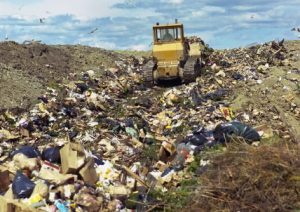Back in 2010, warnings led experts to believe that Britain would become the “dustbin” of Europe.
Today – seven years on – this has not yet happened, but the same concern still troubles Britain, whose landfill space is running out.
According to the Independent, the United Kingdom as a whole buries more than 18,8 million tonnes of household waste, two million tonnes more than any other European country. On top, every year, a grand total of 57 million tonnes of rubbish are being disposed in British landfill.
This has now become problematic.
To Gary Porter, chairman of the Local Government Association, something needs to be done. In his words, an “area the size of Warwick is already being used to dump Britain’s rubbish,” and “radical changes” are needed.
In fact, the present state of British landfills is unsustainable.
With these sites filling up, mountains of rubbish carefully sorted by families for recycling are still being dumped by councils in landfill pits. MPs have also recently warned that the country is unlikely to be able to meet its targets to recycle at least 50 per cent of household waste by 2020, meaning that more waste will be sent to landfills.
Even if the proportion of total waste sent to landfill annually has decreased by nearly a quarter in recent years, the rate at which British landfills are filling up is still concerning.
In recent times, for instance, textile waste has risen to more than one million tonnes, driven by the “Primark effect,” or the tendency to discard low cost clothes quickly. This works against the Government’s attempt to reduce landfill waste, and needs to be stopped.
The consensus is that something needs to be done, soon.
One option is plasma technology. This is about superheating waste that might otherwise go to landfill in an oxygen-deprived environment, producing a clean synthesis gas that can be used to power engines and create electricity.
Plasma technology is in use around the world to clean up dangerous emissions from industrial processes, and nowhere else are gasifiers and plasma being used in tandem, as they are in Swindon.
Yet, more capital is still to be invested in innovations such as this one.
The trouble, in this instance, is that Swindon is a demonstration plant. Nobody has yet committed to buying the full-scale version.
For the time being, recycling is our main way out of today’s landfill crisis.
Political authorities should look to improve their ties with recycling companies, such as KwikSweep, so as to promote waste awareness and reduce landfill waste.
KwikSweep’s idea is that all waste should be “dealt with in a legal and responsible way,” a principle that suits the need to “say no” to landfill waste.
A solution to Britain’s landfill crisis will be found. Yet, this will require collaboration. Here at KwikSweep, we are committed to help solve this crisis.
When we work together, anything is possible.



